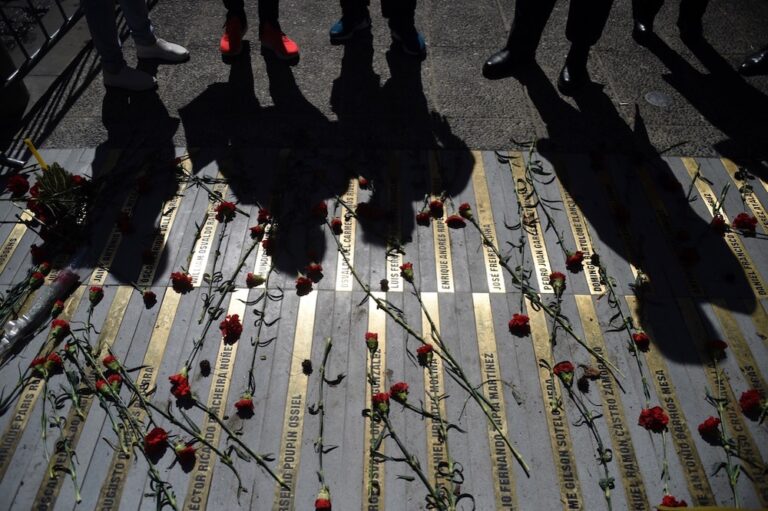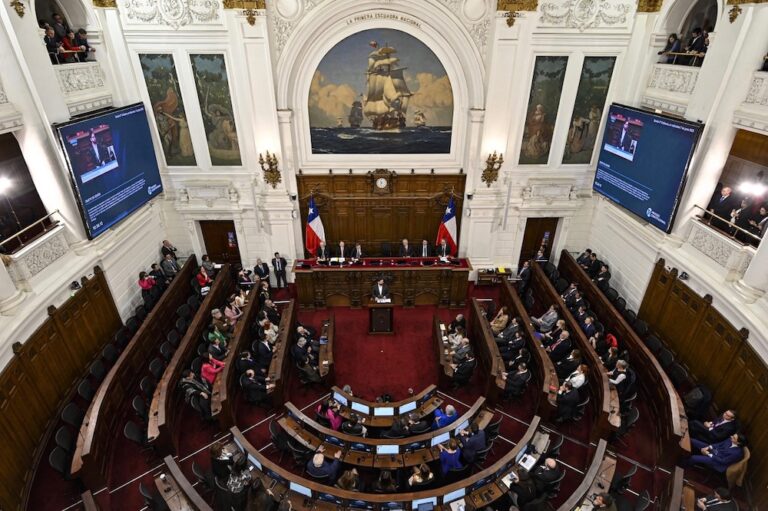(IPYS/IFEX) – On 11 December 2003, Judge Gabriela Pérez, of the Santiago Appeals Court, charged several Chilevisión television station executives and journalists with violating Article 161-A of the Criminal Code. Chilevisión Executive Director Jaime de Aguirre, news producer Alejandro Guillier, news editor Patricio Caldichoury, journalist Fernando Reyes, and production manager Raúl Poblete face charges for […]
(IPYS/IFEX) – On 11 December 2003, Judge Gabriela Pérez, of the Santiago Appeals Court, charged several Chilevisión television station executives and journalists with violating Article 161-A of the Criminal Code.
Chilevisión Executive Director Jaime de Aguirre, news producer Alejandro Guillier, news editor Patricio Caldichoury, journalist Fernando Reyes, and production manager Raúl Poblete face charges for violating Article 161-A, which prohibits the recording of conversations without the knowledge of the individuals involved. Violations of the article are punishable with sentences of 61 days in prison and fines ranging from US$2,453 to US$24,537.
Most of the accused were released after each of them paid US$165 in bail. Guillier, however, remains in detention on the charge of violating paragraphs 1 and 2 of Article 161-A. He is accused of having allowed the use of hidden cameras in a private setting, in addition to being responsible for having permitted the broadcast of the material.
On 5 October, a public statement by Judge Daniel Calvo was broadcast on the midday television and radio news programmes. At the time, the judge was in charge of an investigation into a ring headed by a Chilean businessman that is involved in the abuse and prostitution of minors. In his statement, Calvo admitted that he had recently visited a “sauna”, the term commonly used for brothels in Chile. Prior to this, Guillier had announced that, on 5 October, Chilevisión would air a programme in which the establishment’s manager would identify Calvo as one of his most regular customers. Judge Calvo was also aware that similar information would be published in the biweekly “Plan B” that week.
The programme aired on 5 October on Chilevisión included a recording of a meeting between “sauna” manager Sebastián Rodríguez and Judge Calvo, in the judge’s offices. The conversation was recorded by a hidden camera that was placed in the room by Rodríguez and provided by Chilevisión.
A few days later, the Supreme Court referred the case to the Communications Media Ethics Council and the Journalists’ College Ethics Tribunal. In addition, the court assigned Judge Pérez to investigate the matter and ascertain if a crime had been committed.
Defense lawyer Alfredo Etcheberry announced that he would challenge the charges as he feels that the accused have not committed a crime.
A number of institutions have spoken out against Judge Pérez’s decision. In a press release, Chilevisión representatives said they would respect the ruling but disagree with the decision which they see as an attack on freedom of expression. The Journalists’ College, the Image and Communications Institute’s Freedom of Expression Programme and the University of Chile Journalism School issued statements condemning the ruling and Guillier’s detention.
On 11 December, Guillier was visited by family members, politicians, journalists, representatives of social organisations and others.
The Chamber of Deputies recently approved a bill that imposes greater restrictions on journalists by stipulating that publicising details about the private lives of public figures is only permitted when criminal activities are being exposed. The bill contemplates no exception to media liability even when there is a strong public interest in the information. The bill was passed with 84 votes in favour and one abstention. It will now be brought before the Senate for final approval (see IFEX alert of 11 December 2003).


